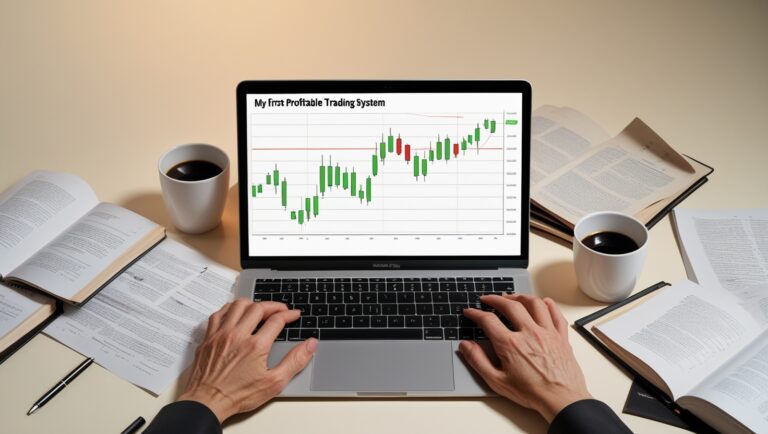How to Choose a Stock Broker That Fits Your Style
How to Choose a Stock Broker That Fits Your Style
Not all brokers are the same. Here’s how to choose the best stock broker that fits your style as a beginner investor or trader, plus tools I personally use to grow wealth.

Table of Contents
When I first decided to invest in the stock market, I thought choosing a broker was just about picking the one with the lowest fees. But as I quickly learned, a stock broker is more than just a platform—it’s the foundation for how you trade, how you research, and even how confident you feel when making financial decisions.
Your broker should match your style. If you’re someone who likes quick, simple trades, you’ll want a beginner-friendly platform. If you prefer research-heavy investing with advanced charts, you’ll need something more powerful. Choosing the wrong one can frustrate you and even cost you money in the long run.
Understand Your Style First
Before picking a broker, ask yourself: What kind of investor am I? Do I want to trade often, or am I looking to buy and hold for the long term? Do I care more about convenience or about having advanced tools?
When I first started, I realized I wanted something simple for quick trades but also something with strong research features for when I got serious. That’s why I now use a combination of Robinhood and Webull. Robinhood gave me confidence when I was brand new, and Webull added the depth I needed later.
Look at the Fees (But Don’t Obsess)
Many beginners get stuck comparing fees. Most modern brokers now offer commission-free trading, which is great. But fees aren’t the only thing to look at. For example, a broker may have low fees but terrible customer service, or it may not offer fractional shares, which are super helpful for beginners.
That’s why it’s smart to consider features as much as costs. For me, having access to fractional shares meant I could start small—even with expensive stocks like Amazon or Tesla.
Tools and Research Matter
The broker you choose determines the tools you’ll have at your fingertips. Early on, I didn’t realize how valuable good charting was. Once I discovered TradingView, I finally understood how to track price trends and spot better entry points.
Even if you’re not a heavy trader, good research tools will help you make smarter decisions and avoid rookie mistakes.
Mobile App vs. Desktop Platform
I’m the kind of person who likes checking stocks on the go, so a smooth mobile app was a must for me. But when I sit down to study charts seriously, I prefer the bigger screen on my computer. That’s another reason I mix platforms—I use my phone for quick trades and my desktop for deep research.
Think about your lifestyle. If you’re always on the move, you’ll want a broker with a user-friendly mobile experience.
Customer Support and Reliability
One thing I learned the hard way is that when markets get crazy, not all brokers handle the traffic well. Some apps crash or freeze when you need them most. Having a reliable broker can save you a lot of stress during volatile times.
I also pay attention to customer support. If something goes wrong, I want to know I can reach someone. It’s not the most exciting feature, but it matters.
Don’t Be Afraid to Try More Than One
Here’s something most beginners don’t realize—you don’t have to stick with just one broker. I personally use multiple accounts. It helps me compare, spread risk, and take advantage of different features.
When I was new, I started small with one platform. As I learned more, I opened others and found the combination that fit me best.
My Biggest Mistake When Choosing a Broker
When I first signed up, I only looked at what was “popular.” I didn’t think about what I actually needed. As a result, I felt limited and frustrated. Once I switched to brokers that matched my style, trading felt much smoother.
That’s why I always recommend taking the time to match your broker with your personal goals and habits—not just what everyone else is using.
Final Thoughts
Choosing the right broker can make your stock trading journey smoother, safer, and even more enjoyable. Don’t rush the process—think about your style, your goals, and the features that matter most to you.
If you want a simple starting point, I recommend:
- Robinhood for ease of use and fractional shares.
- Webull for more advanced tools and rewards.
- TradingView for charting, analysis, and watchlists.
And if you want to see exactly how I use brokers to pay bills and grow wealth step by step, grab my ebook here.
When I first started investing, I assumed all brokers were the same. But once I actually opened accounts, I realized each one had its own strengths and weaknesses. Some made trading super easy, while others gave me powerful research tools I didn’t know I needed. That’s when I understood the importance of matching a broker to my style.
One thing I learned is that beginners often pick a broker based on what’s trending or what a friend uses. That’s not always the best approach. Your investing style might be completely different, and you need a platform that works for you personally, not for someone else.
For example, if you’re a casual investor who just wants to buy and hold a few stocks, simplicity is key. A platform like Robinhood might be perfect because of its clean design and fractional shares. But if you see yourself trading often and analyzing charts, Webull or pairing your broker with TradingView might make more sense.
Another factor to think about is how a broker makes you feel while using it. For me, confidence mattered. I wanted to log in and feel like I knew exactly where to click without being overwhelmed. A confusing layout can make you hesitate—and hesitation in trading often leads to mistakes.
I also underestimated the value of fractional shares. Being able to invest $20 into a stock that costs hundreds or even thousands of dollars per share gave me the freedom to start small without waiting to save up. Not every broker offers this, and it’s one of those little features that can really shape your style of investing.
Some brokers also cater more toward long-term investors. They may offer features like dividend reinvestment plans (DRIPs) or automatic recurring investments. If your goal is long-term growth, those tools can help build wealth without constant monitoring.
Customer experience is another detail I overlooked at first. If your broker’s support is slow or unhelpful, it can create unnecessary stress. When I had my first issue with a transfer, I realized just how important it was to have quick and reliable customer service.
Security also matters. I wanted peace of mind knowing my information and money were safe. Checking whether a broker has strong encryption and two-factor authentication became part of my decision-making process.
One mistake I made early on was signing up for a broker that didn’t offer paper trading. Paper trading is like practice mode—you can test strategies with fake money before risking real cash. Having this option available gave me room to experiment safely.
It also helped me realize that I didn’t need to stick with just one broker forever. In fact, having multiple brokers allowed me to separate different strategies. I could use one for long-term investments and another for short-term trades. This made my finances feel more organized.
Another factor that influenced me was rewards. Brokers like Webull often give free stocks just for signing up and depositing money. Those free shares were a great way to start building my portfolio with little risk.
Over time, I also realized that no broker is “perfect.” Each one has trade-offs. That’s why I tell people not to stress about finding the ultimate broker but instead to find the one that matches where they are in their journey right now.
As your style evolves, your broker choice may change too. The platform that works for you as a beginner might not be the same one you use once you’re trading with larger amounts or exploring advanced strategies. And that’s okay—trading is a journey, and your tools can adapt with you.
What really matters is taking that first step. Don’t get paralyzed by comparing every little feature. Pick one that feels comfortable, start small, and learn along the way. Experience will show you what features you truly need.
At the end of the day, the right broker is the one that gives you confidence, matches your goals, and makes trading feel natural—not forced. Once you find that match, the process of investing feels much smoother and more enjoyable.

Stay ahead in the stock market! Subscribe to our newsletter and receive exclusive stock flow reports, trading insights, and actionable tips directly in your inbox. Join thousands of traders who get our updates first.







